Order-7 tetrahedral honeycomb
From Wikipedia, the free encyclopedia
In the geometry of hyperbolic 3-space, the order-7 tetrahedral honeycomb is a regular space-filling tessellation (or honeycomb) with Schläfli symbol {3,3,7}. It has seven tetrahedra {3,3} around each edge. All vertices are ultra-ideal (existing beyond the ideal boundary) with infinitely many tetrahedra existing around each vertex in an order-7 triangular tiling vertex arrangement.
| Order-7 tetrahedral honeycomb | |
|---|---|
| Type | Hyperbolic regular honeycomb |
| Schläfli symbols | {3,3,7} |
| Coxeter diagrams | |
| Cells | {3,3} |
| Faces | {3} |
| Edge figure | {7} |
| Vertex figure | {3,7}  |
| Dual | {7,3,3} |
| Coxeter group | [7,3,3] |
| Properties | Regular |
Images
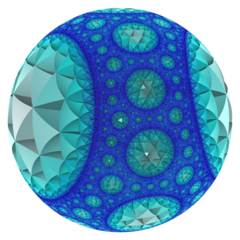 Poincaré disk model (cell-centered) |
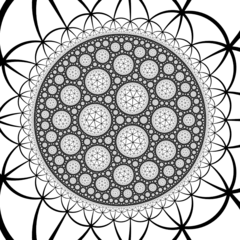 Rendered intersection of honeycomb with the ideal plane in Poincaré half-space model |
Related polytopes and honeycombs
Summarize
Perspective
It is a part of a sequence of regular polychora and honeycombs with tetrahedral cells, {3,3,p}.
It is a part of a sequence of hyperbolic honeycombs with order-7 triangular tiling vertex figures, {p,3,7}.
It is a part of a sequence of hyperbolic honeycombs, {3,p,7}.
Order-8 tetrahedral honeycomb
| Order-8 tetrahedral honeycomb | |
|---|---|
| Type | Hyperbolic regular honeycomb |
| Schläfli symbols | {3,3,8} {3,(3,4,3)} |
| Coxeter diagrams | |
| Cells | {3,3} |
| Faces | {3} |
| Edge figure | {8} |
| Vertex figure | {3,8} {(3,4,3)} |
| Dual | {8,3,3} |
| Coxeter group | [3,3,8] [3,((3,4,3))] |
| Properties | Regular |
In the geometry of hyperbolic 3-space, the order-8 tetrahedral honeycomb is a regular space-filling tessellation (or honeycomb) with Schläfli symbol {3,3,8}. It has eight tetrahedra {3,3} around each edge. All vertices are ultra-ideal (existing beyond the ideal boundary) with infinitely many tetrahedra existing around each vertex in an order-8 triangular tiling vertex arrangement.
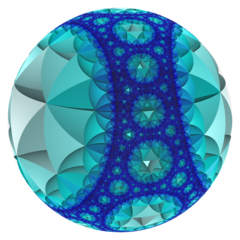 Poincaré disk model (cell-centered) |
 Rendered intersection of honeycomb with the ideal plane in Poincaré half-space model |
It has a second construction as a uniform honeycomb, Schläfli symbol {3,(3,4,3)}, Coxeter diagram, ![]()
![]()
![]()
![]()
![]()
![]() , with alternating types or colors of tetrahedral cells. In Coxeter notation the half symmetry is [3,3,8,1+] = [3,((3,4,3))].
, with alternating types or colors of tetrahedral cells. In Coxeter notation the half symmetry is [3,3,8,1+] = [3,((3,4,3))].
Infinite-order tetrahedral honeycomb
| Infinite-order tetrahedral honeycomb | |
|---|---|
| Type | Hyperbolic regular honeycomb |
| Schläfli symbols | {3,3,∞} {3,(3,∞,3)} |
| Coxeter diagrams | |
| Cells | {3,3} |
| Faces | {3} |
| Edge figure | {∞} |
| Vertex figure | {3,∞} {(3,∞,3)} |
| Dual | {∞,3,3} |
| Coxeter group | [∞,3,3] [3,((3,∞,3))] |
| Properties | Regular |
In the geometry of hyperbolic 3-space, the infinite-order tetrahedral honeycomb is a regular space-filling tessellation (or honeycomb) with Schläfli symbol {3,3,∞}. It has infinitely many tetrahedra {3,3} around each edge. All vertices are ultra-ideal (existing beyond the ideal boundary) with infinitely many tetrahedra existing around each vertex in an infinite-order triangular tiling vertex arrangement.
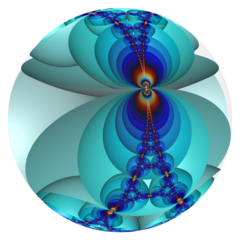 Poincaré disk model (cell-centered) |
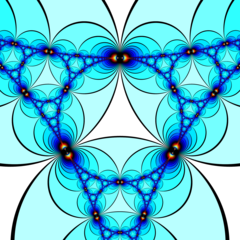 Rendered intersection of honeycomb with the ideal plane in Poincaré half-space model |
It has a second construction as a uniform honeycomb, Schläfli symbol {3,(3,∞,3)}, Coxeter diagram, ![]()
![]()
![]()
![]()
![]()
![]()
![]() =
= ![]()
![]()
![]()
![]()
![]()
![]() , with alternating types or colors of tetrahedral cells. In Coxeter notation the half symmetry is [3,3,∞,1+] = [3,((3,∞,3))].
, with alternating types or colors of tetrahedral cells. In Coxeter notation the half symmetry is [3,3,∞,1+] = [3,((3,∞,3))].
See also
References
External links
Wikiwand - on
Seamless Wikipedia browsing. On steroids.



















